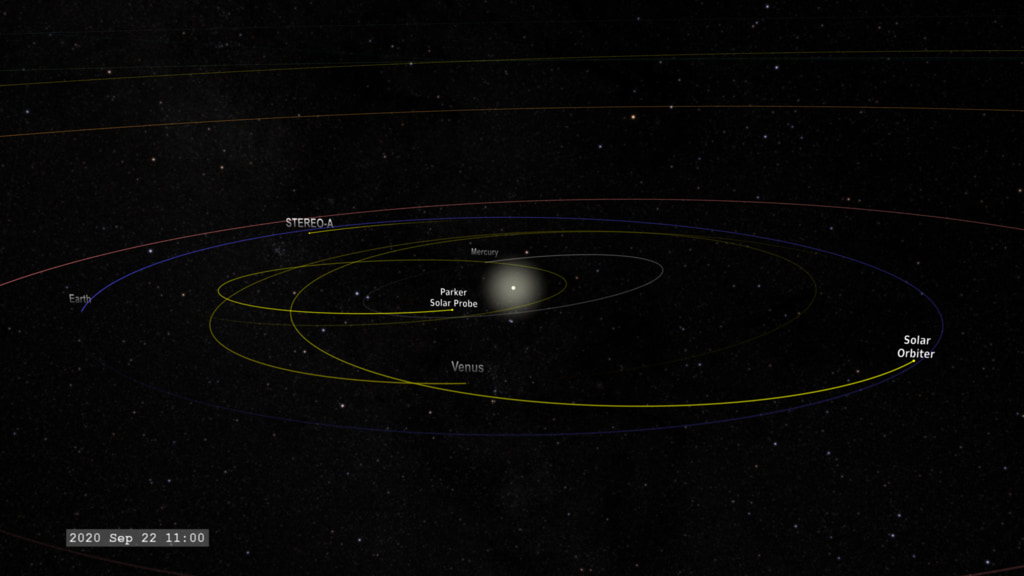Heliophysics Sentinels 2022
There has been one significant change since the 2020 Heliophysics Fleet. SET has been decommissioned. As of Fall 2022, here's a tour of the NASA Heliophysics fleet from the near-Earth satellites out to the Voyagers beyond the heliopause.
Excepting the Voyager missions, the satellite orbits are color coded for their observing program:
Magenta: TIM (Thermosphere, Ionosphere, Mesosphere) observations Yellow: solar observations and imagery Cyan: Geospace and magnetosphere Violet: Heliospheric observations
This visualization presents orbits of the current heliophysics satellites covering the space near Earth, through the solar system, and concluding with a view of the Voyagers, just outside the heliopause.
Near-Earth Fleet:
- Hinode: Observes the Sun in multiple wavelengths up to x-rays. SVS page
- TIMED: Studies the upper layers (40-110 miles up) of Earth's atmosphere. SVS page
- ICON: Works with GOLD on studies of the ionosphere.
- AIM: Images and measures noctilucent clouds. SVS page
- IRIS: Interface Region Imaging Spectrograph is designed to take high-resolution spectra and images of the region between the solar photosphere and solar atmosphere. SVS page
Geosynchronous Fleet:
- SDO: Solar Dynamics Observatory keeps the Sun under continuous observation at 16 megapixel resolution. SVS page
- GOLD: Global-scale Observations of the Limb and Disk is a spectroscopic imager for studying the ionosphere.
Geospace Fleet:
- Geotail: Conducts measurements of electrons and ions in the Earth's magnetotail. SVS page
- Magnetospheric Multi-scale (MMS): This is a group of four satellites which fly in formation to measure how particles and fields in the magnetosphere vary in space and time. SVS page
- THEMIS: This is a fleet of three satellites to study how magnetospheric instabilities produce substorms. Two of the original five satellites were moved into lunar orbit to become THEMIS-ARTEMIS.SVS page
- IBEX: The Interstellar Boundary Explorer measures the flux of neutral atoms from the heliopause. SVS page
This visualization presents orbits of the current heliophysics satellites covering the space near Earth.
Lunar Orbiting Fleet:
- THEMIS-ARTEMIS: Two of the THEMIS satellites were moved into lunar orbit to study the interaction of the Earth's magnetosphere with the Moon. SVS page
This visualization presents orbits of the current heliophysics satellites covering the space near Earth out to lunar orbit.
Sun-Earth Lagrange Point One Fleet:
The L1 point is a Lagrange Point between the Sun and the Earth. Spacecraft can orbit this location for continuous coverage of the Sun.
This visualization presents orbits of the current heliophysics satellites covering the space near Earth out to the Earth-Sun Lagrange Point 1, positioned between the Sun and Earth.
Solar Orbiting Fleet:
- STEREO-A: The remaining STEREO spaceraft orbits the Sun in roughly the same orbit as Earth. SVS page
- Parker Solar Probe: On an orbit that takes it closer to the Sun than any other mission. SVS page
- Solar Orbiter: On an orbit that takes it to high solar latitudes. SVS page
This visualization presents orbits of the current heliophysics satellites covering the space near Earth, through to the inner solar system.
Interstellar Fleet:
- Voyager 1 & Voyager 2: The two Voyager spaceraft orbit originally performed flybys of the outer planets of the solar system but continued to operate. They are now the most distant monitors of the plasma in the space between the stars. At the time of this visualization, Voyager 2 has just crossed the heliopause.SVS page
Credits
Please give credit for this item to:
NASA's Scientific Visualization Studio
-
Visualizer
- Tom Bridgman (Global Science and Technology, Inc.)
-
Technical support
- Laurence Schuler (ADNET Systems, Inc.)
- Ian Jones (ADNET Systems, Inc.)
Missions
This page is related to the following missions:- ACE
- Geotail
- Global-scale Observations of the Limb and Disk (GOLD)
- Hinode (Solar-b)
- IBEX
- Ionospheric Connection Explorer (ICON)
- IRIS: Interface Region Imaging Spectrograph
- Magnetospheric Multiscale (MMS)
- Parker Solar Probe
- SDO
- SOHO
- Solar Orbiter Collaboration
- STEREO
- THEMIS
- THEMIS and ARTEMIS
- TIMED
- Voyager
- Wind
Series
This page can be found in the following series:Datasets used
-
SSCweb ephemerides (SSCweb)
ID: 538Satellite ephemerides
This dataset can be found at: http://sscweb.gsfc.nasa.gov
See all pages that use this dataset -
Space-Track TLE (Space-Track Two-Line Elements)
ID: 753Satellite ephemerides
This dataset can be found at: http://Space-Track.org
See all pages that use this dataset -
DE 431
ID: 985Planetary ephemerides SPICE kernel
See all pages that use this dataset
Note: While we identify the data sets used on this page, we do not store any further details, nor the data sets themselves on our site.
Release date
This page was originally published on Wednesday, November 23, 2022.
This page was last updated on Sunday, February 2, 2025 at 12:15 AM EST.
